This website uses cookies so that we can provide you with the best user experience possible. Cookie information is stored in your browser and performs functions such as recognising you when you return to our website and helping our team to understand which sections of the website you find most interesting and useful.
*:not([hidden]):not(style) ~ *:not([hidden]):not(style){margin-top:1rem;}
]]>
*{margin:calc(0.5rem / 2);}
]]>
*:not([hidden]):not(style) ~ *:not([hidden]):not(style){margin-top:1rem;}
]]>
Ethiopia's forces have captured two towns in the northern region of Tigray where soldiers loyal to the local political party are fighting the central government.
Tigray's leader confirmed the losses but said it was a temporary setback and vowed to defeat the government.
Ethiopia's prime minister has said that his army is advancing on the Tigrayan capital Mekelle.
Hundreds of people have reportedly died in two weeks of clashes.
Verifying information from Tigray is hard due to a blackout on most communications.
The conflict is rooted in long-standing tension between powerful regional party the Tigray People's Liberation Front (TPLF) and Ethiopia's central government.
When Ethiopian Prime Minister Abiy Ahmed postponed a national election due to coronavirus in June, tension escalated between the two groups. The TPLF sees the central government as illegitimate, arguing Mr Abiy no longer has a mandate to lead the country.
The government accused the TPLF of attacking a military base to steal weapons, which the TPLF denied. In response, Mr Abiy ordered a military offensive, accusing the TPLF of treason.
What's the latest?
Government forces seized the towns of Shire and Axum after a three-day deadline given by Prime Minister Abiy to Tigray's forces to surrender expired on Tuesday.
TPLF leader Debretsion Gebremichael, who was born in Shire, confirmed to a local TV station that his soldiers had lost control of the towns in the south and west of Tigray. But he said their victory was temporary and he vowed to defeat Mr Abiy's forces.
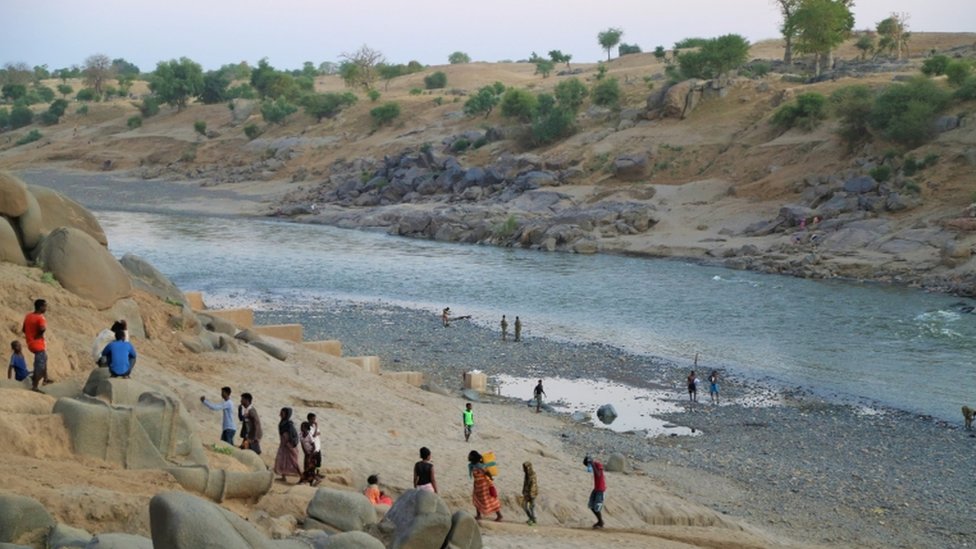
image copyrightReuters
As fighting raged on Wednesday, Mr Gebremichael said his forces were inflicting "heavy defeats on all fronts against the forces that came to attack us". He called on all Tigrayans including children to mobilise and join the "struggle".
Ethiopian officials accused the TPLF of destroying four bridges close to the Tigray capital Mekelle, but the group denied the claims.
The prime minister suggested on Tuesday that the fighting was coming to an end, saying "the final critical act of law enforcement will be done in the coming days".


At least 27,000 people have fled over the northern border to Sudan as the UN warned a "full-scale humanitarian crisis" was unfolding.
TPLF adviser Fesseha Tessema, a former Ethiopian diplomat, told the BBC that civilian sites in Mekelle were being bombed by federal forces.
"[The people of Tigray] haven't done anything wrong, they are in their own homes, churches," Mr Fesseha said.
The federal government has denied targeting civilians and said that air attacks are aimed at the Tigrayan military.
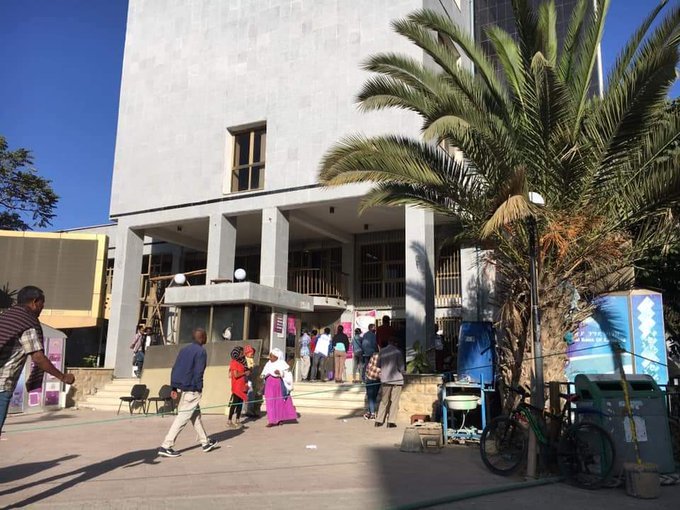

Deadly airstrike hits bustling city
By a BBC reporter in Mekelle
A deadly air strike just before noon on Tuesday killed two people and injured others in Mekelle, doctors said. It is not yet clear who carried it out.
I was out on the streets shortly afterwards and saw an ambulance carrying people to hospital. Witnesses told me a young boy - one of the wounded - died on arrival, and three others are still receiving treatment.
Because the banks had reopened, people in the city were out shopping at the time the incident took place. There have been other strikes in the city which did not cause casualties but caused a lot of damage to buildings.
I went out to assess the situation and found houses with collapsed walls and roofs, and bridges destroyed. Artillery has created craters on key roads. Local people have been milling around in the affected areas, discussing the attacks and the damage.
How bad is the humanitarian crisis?
The UN's refugee agency, the UNHCR, has said that thousands of people have been fleeing the fighting.
The agency was "on stand-by to provide assistance in Tigray when access and security allow" spokesman Babar Baloch said.
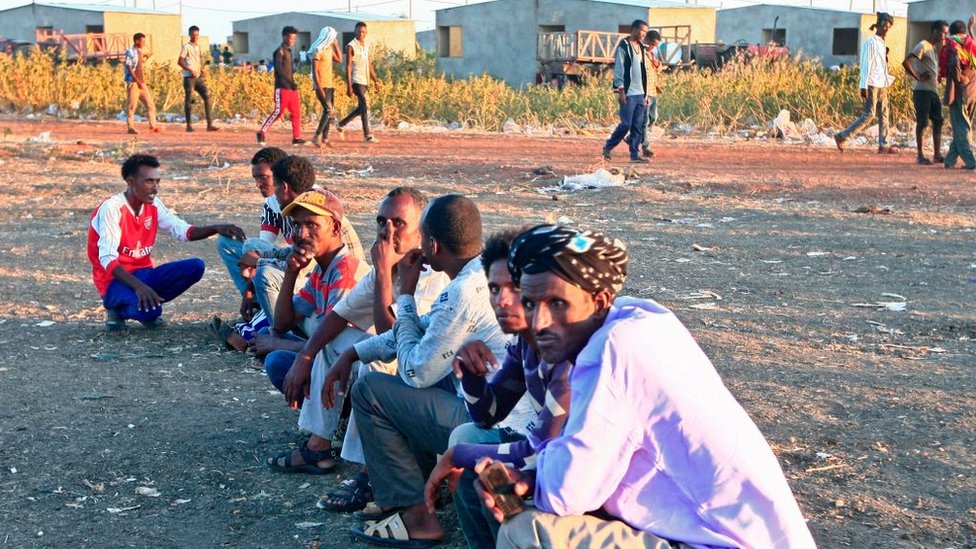
"There may be massive displacement inside Tigray and that is of course a concern and we try to prepare the best way possible," Jens Laerke, spokesman of the UN Office for the Coordination of Humanitarian Affairs (OCHA), said.
The UN fears the numbers fleeing Ethiopia may be just a fraction of those forced from their homes by the fighting, but for the moment aid agencies have no access to the Tigray region.
Regional powers Kenya and Uganda have called for negotiations to find a peaceful resolution to the conflict.
The Ethiopian government has, however, ruled out talks with the TPLF.
How bad is the violence?
Human rights group Amnesty International said it had confirmed that "scores, and likely hundreds, of people were stabbed or hacked to death" in the town of Mai-Kadra (May Cadera) on Monday last week.
Mr Abiy has accused forces loyal to Tigray's leaders of carrying out the mass killings. The TPLF has denied involvement, saying it will welcome an independent international investigation.
Ethiopia's human rights commission said it would send a team to investigate.
Why are the government and TPLF fighting?
The TPLF dominated Ethiopia's military and political life for decades before Mr Abiy took office in 2018 and pushed through major reforms.
Last year, Mr Abiy dissolved the ruling coalition, made up of several ethnically based regional parties, and merged them into a single, national party, which the TPLF refused to join.

The feud escalated in September, when Tigray held a regional election, defying a nationwide ban on all polls imposed because of the coronavirus pandemic. Mr Abiy responded by calling the vote illegal.
Tigray's administration sees Mr Abiy's reforms as an attempt to hand his central government more power and weaken regional states.
It also resents what it calls the prime minister's "unprincipled" friendship with Eritrean President Isaias Afwerki.
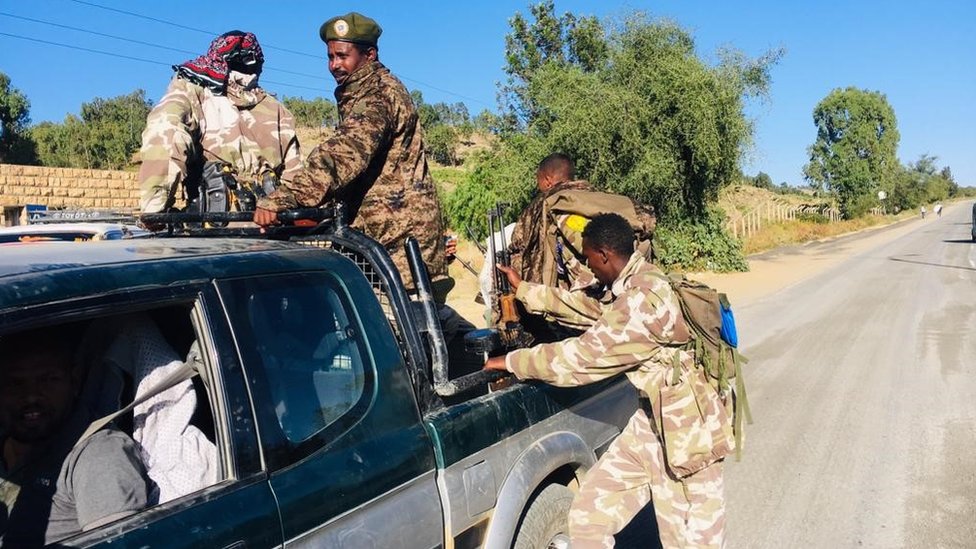
Mr Abiy won the Nobel Peace Prize in 2019 for his efforts to bring peace with Eritrea.
The prime minister believes TPLF officials are undermining his authority.2

Five things about Tigray:
1. The Kingdom of Aksum was centred in the region. Described as one of the greatest civilisations of the ancient world, it was once the most powerful state between the Roman and Persian empires.
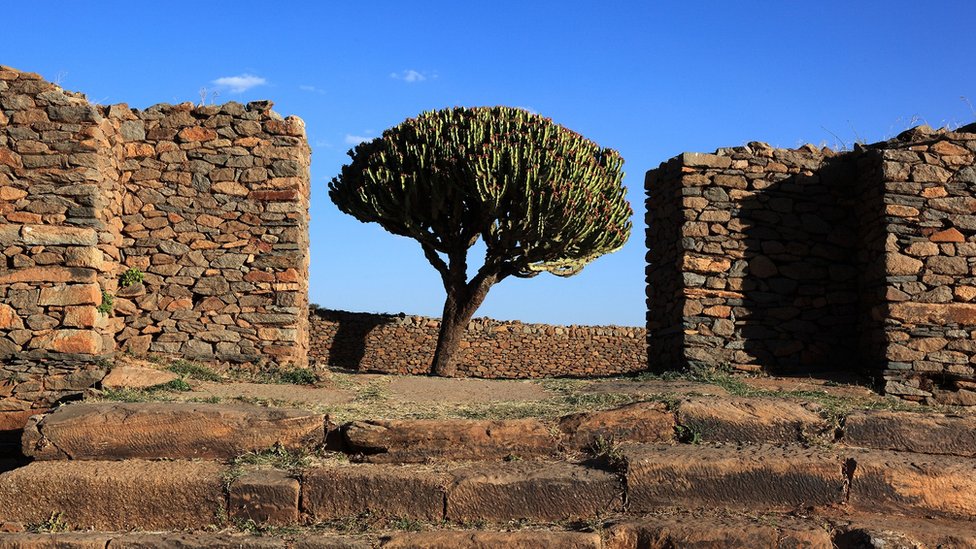
2. The ruins of the city of Aksum are a UN World Heritage Site. The site, dating from between the 1st and 13th Century AD, features obelisks, castles, royal tombs and a church which is believed by some to house the Ark of the Covenant.
3. Most people in Tigray are Ethiopian Orthodox Christians. The region's Christian roots stretch back 1,600 years.
4. The region's main language is Tigrinya, a Semitic dialect with at least seven million speakers worldwide.
5. Sesame is a major cash crop, exported to the US, China and other countries.



 Africana55 Radio
Africana55 Radio 
